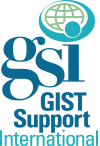Off-Label Use of FDA-Approved Drugs
Once a drug is FDA-approved for one condition, it is possible for a physician to prescribe it for a different condition at the physician’s discretion. Insurance may not pay for off-label prescriptions, however. If a patient has exhausted the three drugs approved specifically for GIST (imatinib, sunitinib, and regorafenib), then it is worthwhile to discuss both current clinical trials and the following drugs with the treating physician.
Drugs with Completed GIST Trials and NCCN Mention for GIST
The following drugs have a track record in treating GIST. Some have not undergone a rigorous Phase III trial needed for FDA approval, while others did not reach their statistical goals for FDA approval. The NCCN GIST treatment guidelines (within the NCCN Soft Tissue Sarcoma guideline) mention both sorafenib and nilotinib for possible off-label use for GIST resistant to imatinib and sunitinib The GSI webpages about each one indicate any supporting data that have been presented at medical meetings or published about effectiveness against GIST.
Sorafenib (Nexavar)
Nilotinib (Tasigna)
Drugs without Completed GIST Trials
For the next group of drugs there are no published data about effectiveness against GIST, but anecdotal evidence exists in the form of informal comments from patients being cared for at well-known GIST treatment centers who have been prescribed these drugs, or from the prescribing physicians. For example, several members of our listserv have reported some success with the combination of a TKI and an mTOR inhibitor. Trials for GIST may be ongoing (for pazopanib, for instance). In other cases there is a rationale but data are lacking.
Dasatinib (Sprycel)
Pazopanib (Votrient)
Sirolimus (Rapamune)
Everolimus (Afinitor)
Temsirolimus (Torisel)
Vorinostat (Zolinza)
Ixabepilone (Ixempra)
Bevacizumab (Avastin)

